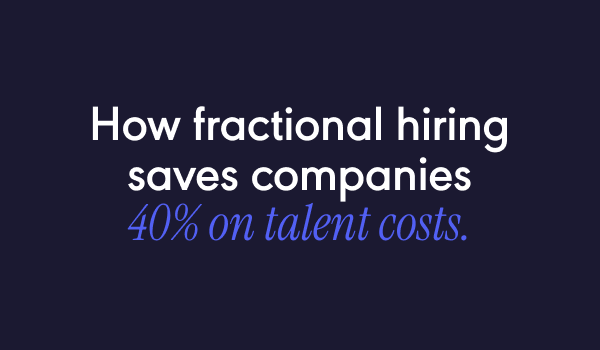In today’s fast-paced, efficiency-driven business landscape, smart companies are turning to a new model of hiring that’s disrupting traditional staffing norms: fractional hiring. More than just a buzzword, this approach enables companies to access high-caliber talent without committing to the full-time costs typically associated with executive or specialist roles. The result? Up to 40% in talent cost savings—without sacrificing quality.
Let’s break down what fractional hiring is, why it works, and how it’s transforming talent acquisition and budgeting.
What Is Fractional Hiring?
Fractional hiring refers to engaging professionals—often with senior-level expertise—on a part-time, contract, or project basis. These individuals might be fractional CMOs, CFOs, CTOs, or specialized consultants, brought in to solve specific problems, drive strategic initiatives, or temporarily fill critical gaps.
Unlike traditional employees, fractional hires typically work with several companies simultaneously, offering each a fraction of their time. Think of it as renting world-class talent at a fraction of the price.
Where the 40% Cost Savings Come From
1. No Full-Time Salary Obligations
A full-time C-level executive or specialist can command six- or even seven-figure salaries. When you hire fractionally, you’re only paying for the time and expertise you actually need. A startup needing 15 hours per month of CFO-level insight doesn’t need to pay $250,000/year—they might pay $5,000/month for a seasoned fractional CFO instead. That’s a 40-60% cost reduction right there.
2. No Overhead or Benefits
Fractional workers are typically contractors. That means no benefits, bonuses, payroll taxes, or equity packages—all of which add 20–30% or more to the cost of a full-time employee. Companies only pay for deliverables and results, not overhead.
3. Reduced Risk and Faster ROI
Hiring the wrong full-time employee is expensive and time-consuming. With fractional professionals, businesses can test roles or strategies without long-term commitments. If the engagement doesn’t produce ROI, it can be adjusted quickly without severance costs or reputation risk.
4. Higher Efficiency and Focus
Fractional professionals often bring years of niche expertise and a laser focus to the table. They don’t need weeks of onboarding or supervision. This accelerated ramp-up time leads to better outcomes in less time—and time is money.
5. Scalable Flexibility
Companies can scale fractional hours up or down as needed. That agility prevents overhiring during slow seasons or under-resourcing during crunch times. Strategic budgeting of talent hours ensures no wasted capacity.
Who’s Using Fractional Talent?
- Startups who need senior leadership but can’t afford full-time salaries
- SMBs looking to upgrade operations without bloating headcount
- Enterprises wanting to fill interim roles or pilot new initiatives
- VC-backed companies who need to show traction quickly with limited capital
Real-World Example
A Series A tech company needed marketing leadership but didn’t have $200,000+ to hire a CMO. They brought on a fractional CMO at $6,000/month. Over six months, this hire helped them clarify their brand, build a scalable growth strategy, and train an internal junior marketer. The company saved over $100,000 and gained investor confidence to raise their next round.
Is Fractional Hiring Right for You?
If you’re facing any of these scenarios, fractional hiring may be the ideal solution:
- You’re scaling quickly but not ready for full-time exec hires
- You need specialized expertise for a defined time or project
- You want to reduce burn rate without losing strategic talent
- You’re experimenting with a new function or initiative
Final Thoughts
Fractional hiring isn’t just a stopgap; it’s a strategic advantage in today’s lean and agile economy. Companies that embrace this model are not only cutting costs—they’re unlocking access to better, more specialized talent exactly when they need it.
In a world where every dollar counts, fractional hiring can be the 40% savings that fuels 100% growth.

